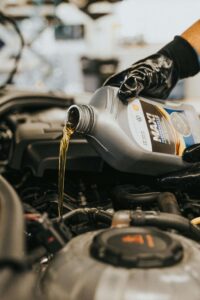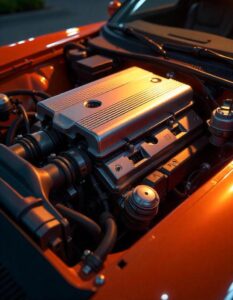When it comes to selecting a car, the engine is arguably the heart of the vehicle.
It significantly influences performance, efficiency, and overall driving experience. But with an array of options available, how do you determine which engine is best suited for your needs?
In this comprehensive guide, we’ll explore different types of engines, their advantages and disadvantages, and ultimately help you find the best engine for your vehicle.

Understanding Engine Types
Before diving into specifics, it’s vital to understand the types of engines on the market:
- Internal Combustion Engines (ICE)
- Electric Engines
- Hybrid Engines
- Diesel Engines
Each engine type has unique characteristics, and recognizing these can help you make an informed choice.
Internal Combustion Engines (ICE)
Internal combustion engines are the most common type found in vehicles today. They operate by burning gasoline or diesel to create power. But what makes them popular?

Advantages:
- Widely Available: ICEs are found in most vehicles, making it easy to find parts and service.
- Variety of Options: From compact cars to heavy-duty trucks, ICEs come in numerous configurations and sizes.
- Performance: Many ICEs offer high horsepower and torque, making them suitable for various driving conditions.
Disadvantages:
- Fuel Consumption: They generally consume more fuel than electric or hybrid engines.
- Emissions: ICEs emit pollutants, contributing to environmental concerns.
Best Choice: If you are looking for a reliable and powerful engine for everyday driving, consider the Ford EcoBoost Engine. With models that deliver impressive horsepower and fuel efficiency, it strikes a balance between performance and economy.
Electric Engines
Are you ready to embrace a greener future? Electric engines are becoming increasingly popular, especially as concerns about climate change grow.
Advantages:
- Zero Emissions: Electric vehicles (EVs) produce no tailpipe emissions.
- Lower Operating Costs: Electricity is often cheaper than gasoline, and EVs require less maintenance.
- Instant Torque: Electric motors provide quick acceleration, enhancing the driving experience.
Disadvantages:
- Limited Range: Many EVs have a limited range compared to gasoline vehicles.
- Charging Infrastructure: Depending on your location, charging stations may be sparse.
Best Choice: The Tesla Model 3 is an excellent electric vehicle that offers an impressive range, quick acceleration, and advanced technology features. It’s an ideal choice for those who prioritize sustainability without sacrificing performance.
Hybrid Engines
Hybrid engines combine an internal combustion engine with an electric motor, offering the best of both worlds. But is a hybrid the right choice for you?
Advantages:
- Fuel Efficiency: Hybrids typically achieve better fuel economy than traditional ICEs.
- Reduced Emissions: By using electric power, hybrids produce fewer emissions.
- Versatility: They can run on gasoline, electricity, or a combination of both.
Disadvantages:
- Complexity: Hybrids have more components, which can lead to higher repair costs.
- Battery Replacement: Over time, the battery may need to be replaced, which can be expensive.
Best Choice: The Toyota Prius is the quintessential hybrid vehicle, known for its reliability and fuel efficiency. With a combined fuel economy of up to 56 MPG, it’s perfect for cost-conscious drivers.
Diesel Engines
If you need a vehicle for towing or heavy-duty applications, diesel engines might be your best fit.
Advantages:
- Torque: Diesel engines produce higher torque, making them excellent for towing.
- Fuel Efficiency: Diesel engines are generally more fuel-efficient than gasoline engines.
- Durability: They tend to have a longer lifespan with proper maintenance.
Disadvantages:
- Initial Cost: Diesel vehicles can be more expensive to purchase.
- Emissions: Although they are fuel-efficient, diesel engines can emit pollutants.
Best Choice: The Ram 2500 Heavy Duty equipped with a 6.7L Cummins diesel engine is ideal for those who need a durable workhorse that can handle heavy loads while providing a comfortable ride.
Cost Analysis
How much are you willing to invest in your vehicle? The initial cost is just one part of the equation. Here’s a breakdown of the price ranges for each engine type:
- Internal Combustion Engines: Generally range from $20,000 to $40,000 for standard vehicles.
- Electric Engines: Typically cost between $30,000 and $70,000, but tax incentives can help offset this.
- Hybrid Engines: Priced between $25,000 and $50,000, hybrids provide a middle ground.
- Diesel Engines: Cost between $30,000 and $60,000, often with lower fuel expenses.
Evaluating Total Cost of Ownership
When considering cost, it’s crucial to factor in not just the purchase price but also long-term expenses like fuel and maintenance.
Wouldn’t it be wise to invest in a vehicle that offers long-term savings? For instance, electric vehicles may have a higher initial cost but often have lower operating costs. A study by the U.S. Department of Energy found that EVs can save drivers over $700 annually on fuel compared to gasoline vehicles.
Performance Metrics
What kind of performance do you expect from your vehicle? Let’s break down the performance metrics for each engine type.
Internal Combustion Engine Performance
- Horsepower: A standard gasoline engine produces between 150-300 hp.
- Torque: Diesel engines often provide higher torque (300-600 lb-ft), making them ideal for towing.
If you seek a versatile engine, the Chevrolet Silverado 1500 features a 5.3L V8 engine that produces 355 hp and 383 lb-ft of torque, making it an excellent choice for both work and play.
Electric Engine Performance
Electric motors provide instant torque, resulting in rapid acceleration.
For those who want a thrilling driving experience, the Ford Mustang Mach-E offers up to 480 hp and can accelerate from 0 to 60 mph in just 3.5 seconds, proving that EVs can deliver high performance.
Hybrid Engine Performance
Hybrids typically offer lower horsepower but excel in fuel efficiency.
The Honda Accord Hybrid combines a 2.0L Atkinson-cycle engine with an electric motor for a total of 212 hp and a remarkable 48 MPG combined fuel economy, making it a fantastic family sedan.
Diesel Engine Performance
Diesel engines are known for their torque and fuel efficiency.
The Ford Super Duty F-250, with its 6.7L Power Stroke turbo diesel engine, produces up to 475 hp and an astonishing 1,050 lb-ft of torque, making it perfect for towing and heavy-duty applications.
Size Considerations
What size engine do you need based on your driving habits? Let’s explore the options:
Small Engines (Under 2.0L)
Ideal for compact cars and city driving, these engines are fuel-efficient but may lack power for towing.
If you’re looking for a compact vehicle, the Honda Fit features a 1.5L 4-cylinder engine that offers a combined MPG of 36, making it perfect for urban driving.
Medium Engines (2.0L – 3.5L)
These engines are common in sedans and SUVs, striking a balance between power and efficiency.
The Toyota RAV4 comes with a 2.5L 4-cylinder engine that delivers 203 hp and up to 35 MPG on the highway, making it a great choice for families.
Large Engines (3.5L and Above)
Large engines provide high power and towing capacity, ideal for trucks and performance vehicles.
The GMC Sierra 1500, equipped with a 6.2L V8 engine that produces 420 hp, is perfect for those who need a truck that combines power and luxury.
Lifespan and Reliability
How long do you expect your engine to last? Let’s break down the lifespan of different engine types:
- Internal Combustion Engines: Typically last 150,000 to 300,000 miles with proper maintenance.
- Electric Engines: Electric motors can last over 300,000 miles, but battery life usually ranges from 100,000 to 200,000 miles.
- Hybrid Engines: Similar to traditional engines, lasting around 150,000 to 250,000 miles.
- Diesel Engines: Known for their longevity, diesel engines can exceed 500,000 miles.
Wouldn’t you want an engine that offers long-term reliability? The Toyota Land Cruiser is renowned for its durability, often lasting well over 300,000 miles with minimal issues, making it an excellent investment.
Assessing Your Driving Needs
What do you primarily use your vehicle for? Understanding your driving habits is crucial in selecting the right engine. Here are some questions to consider:
- Daily Commute: Do you drive short distances daily, or do you frequently embark on long road trips?
- Towing and Hauling: Will you need to tow a trailer or carry heavy loads?
- Performance: Are you looking for speed and power, or is fuel efficiency your top priority?
- Terrain: Will you be driving mostly in the city, on highways, or off-road?
How do your driving habits influence your engine choice? For example, if you primarily drive in the city, a smaller engine or hybrid may be more suitable.
Evaluating Fuel Efficiency
Fuel efficiency is a significant consideration when choosing an engine. Not only does it affect your wallet, but it also impacts the environment.
Wouldn’t it be beneficial to save money on fuel while also reducing your carbon footprint?
Recommended Fuel-Efficient Products
- Toyota Prius: Known for its outstanding fuel economy, the Prius offers up to 56 MPG combined.
- Hyundai Ioniq: This compact hybrid boasts a remarkable 58 MPG combined, making it an excellent choice for city driving.
Both vehicles provide excellent fuel efficiency, making them ideal for daily commuters who want to save money on gas.
Reliability and Maintenance
Choosing a reliable engine can save you time and money in the long run. Some engines are known for their longevity, while others might require more frequent maintenance.
Is it worth investing in a vehicle with lower maintenance costs?
Recommended Reliable Products
- Honda Accord: Renowned for its reliability, the Accord is often rated as one of the most dependable sedans on the market.
- Subaru Outback: Known for its all-wheel-drive capabilities and durability, the Outback is a favorite among outdoor enthusiasts.
Both vehicles are backed by strong reputations for reliability, making them smart choices for long-term ownership.
Environmental Impact
With growing concerns about climate change, the environmental impact of your engine choice cannot be overlooked.
Wouldn’t you want to contribute to a cleaner environment while enjoying your drive?
Recommended Eco-Friendly Products
- Nissan Leaf: An all-electric vehicle that offers zero emissions and a range of up to 226 miles.
- Toyota Camry Hybrid: Combines a traditional gasoline engine with an electric motor for improved fuel efficiency and reduced emissions.
Both options allow you to reduce your carbon footprint without sacrificing convenience.
Conclusion
Choosing the best car engine involves a careful analysis of your specific needs, driving habits, and budget. Whether you opt for an internal combustion engine for performance, an electric engine for sustainability, a hybrid for fuel efficiency, or a diesel engine for durability, each choice has its merits.
So, are you ready to find the engine that best suits your lifestyle? By considering the information outlined in this guide, you can make an informed decision and enjoy the ride ahead!
